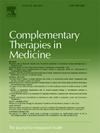将硒作为癌症患者辅助治疗的系统性综述。
IF 3.3
3区 医学
Q1 INTEGRATIVE & COMPLEMENTARY MEDICINE
引用次数: 0
摘要
背景:硒是一种具有抗氧化特性的微量元素,其对癌症治疗的益处已被广泛研究。本系统综述旨在对硒作为癌症患者辅助治疗的有效性的现有证据进行批判性评估:2023 年 5 月,我们对五个电子数据库(Embase、Cochrane、PsychInfo、CINAHL 和 Medline)进行了系统性检索,以查找有关硒替代疗法对接受癌症治疗的成年癌症患者的使用、有效性和潜在危害的研究。事先确定了纳入和排除患者的标准:从 4511 条搜索结果中,本系统综述纳入了 14 种出版物中的 12 项研究,共涉及 2483 名患者。综述研究涉及的癌症类型包括非霍奇金淋巴瘤、头颈癌、甲状腺癌、急性髓细胞或急性淋巴细胞白血病、I期非小肺癌、乳腺癌、宫颈癌和子宫内膜癌、前列腺癌和非浸润性尿路上皮癌。常见的结果包括 PSA 变化、放疗相关毒性反应、总生存期(OS)、无复发间隔期(RFI)和生活质量(QoL)。大多数研究在偏倚风险评估方面存在一些问题。研究结果各不相同:在放疗毒性方面,基线Se水平充足的患者不会从补充Se中获益,而基线Se水平不足的患者在某些方面的毒性会显著降低。与对照组/安慰剂组相比,无论血液中的Se水平如何,患者在OS、无复发间隔期、无进展间隔期、生活质量和PSA方面都没有获益:由于所纳入研究的结果非常不一致且存在方法上的局限性,因此无法明确说明补充 Se 的有效性,但缺乏 Se 的癌症患者在放疗或化疗期间可从补充 Se 中获益。进一步的研究应将 Se 缺乏症作为纳入标准,并分析干预期间的 Se 水平。本文章由计算机程序翻译,如有差异,请以英文原文为准。
A systematic review of Selenium as a complementary treatment in cancer patients
Background
Selenium, a trace element with antioxidant properties, has been widely studied for its benefits in cancer treatment. This systematic review aims to critically evaluate existing evidence on the effectiveness of selenium as a complementary treatment in cancer patients.
Method
In May 2023, a systematic search was conducted searching five electronic databases (Embase, Cochrane, PsychInfo, CINAHL and Medline) to find studies concerning the use, effectiveness and potential harm of selenium substitution therapy on adult cancer patients undergoing cancer treatment. Including and excluding patient criteria were defined beforehand.
Results
From 4511 search results, 12 studies in 14 publications with 2483 patients were included in this systematic review. Types of cancer covered in the reviewed studies are non-Hodgkin lymphoma, head and neck cancer, thyroid cancer, acute myeloid or acute lymphocytic leukaemia, stage I non-small lung cancer, breast cancer, cervical and endometrial cancer, prostate cancer and non-invasive urothelial carcinoma. Common outcomes were PSA change, radiotherapy associated toxicities, overall survival (OS), recurrence free interval (RFI) and quality of life (QoL). Most studies showed some concerns in the risk of bias evaluation. The results were heterogeneous: Regarding radiotherapy toxicities, patients with sufficient levels of Se at baseline do not profit of Se supplementation, while those with a deficiency of Se at baseline have significantly reduced toxicities on some scales. Regardless blood levels of Se, no benefit was found for OS, Recurrence Free Interval, Progression Free Interval, Quality of life and PSA compared to control/placebo group.
Conclusion
Due to the very heterogeneous results and methodical limitations of the included studies, a clear statement regarding the effectiveness of Se supplementation is not possible, whereas cancer patients with a Se deficiency could profit from a Se supplementation during radio- or chemotherapy. Further studies should define Se deficiency as inclusion criterion and analyze levels of Se during time of intervention.
求助全文
通过发布文献求助,成功后即可免费获取论文全文。
去求助
来源期刊

Complementary therapies in medicine
医学-全科医学与补充医学
CiteScore
8.60
自引率
2.80%
发文量
101
审稿时长
112 days
期刊介绍:
Complementary Therapies in Medicine is an international, peer-reviewed journal that has considerable appeal to anyone who seeks objective and critical information on complementary therapies or who wishes to deepen their understanding of these approaches. It will be of particular interest to healthcare practitioners including family practitioners, complementary therapists, nurses, and physiotherapists; to academics including social scientists and CAM researchers; to healthcare managers; and to patients. Complementary Therapies in Medicine aims to publish valid, relevant and rigorous research and serious discussion articles with the main purpose of improving healthcare.
 求助内容:
求助内容: 应助结果提醒方式:
应助结果提醒方式:


